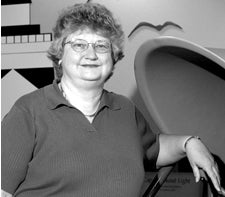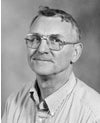UNC honors four health sciences professors
Four faculty members from the East Carolina University Division of Health Sciences have been recognized for their accomplishments in teaching by the University of North Carolina Board of Governors.
Recipient of the top award for ECU faculty is Dr. Iona Poston of the Department of Parent Child Nursing in the School of Nursing. She received the Board of Governors Award for Excellence in Teaching, which carries a $7,500 cash prize.

Dr. Iona Poston of the ECU School of Nursing has received the university’s top teaching award from the UNC Board of Governors. Photos by Cliff Hollis
Of the six total ECU faculty members who received a Board of Governors Distinguished Professor of Teaching Award, three are from the Division of Health Sciences: Dr. Hubert Burden of the Department of Anatomy and Cell Biology at the Brody School of Medicine, Dr. Phillip Pekala of the Department of Biochemistry and Molecular Biology at the medical school, and Dr. Carol Ferreira of the Department of Community Nursing Systems at the nursing school.
Teaching is ‘refreshing and stimulating’
For Poston, being notified Jan. 31 that she had been chosen as ECU’s winner of the Award for Excellence in Teaching was one of the hardest secrets she’s ever had to keep. She couldn’t utter a word to family, friends or colleagues until the April 30 campus ceremony.
“I was sort of in a state of shock,” she said. “All of my friends and colleagues couldn’t understand why things that usually upset me didn’t over the past few months. Anytime something would happen, I would just think of the award and smile.”
Poston began her academic career in 1979 at Clemson University and came to ECU in 1989 after teaching at Florida State University. Since 1973, she has honed her clinical skills, working directly with patients as a hospital staff nurse and at summer camps. Her nursing career started in pediatrics at Memorial Mission Hospital in Asheville.
For Poston, student interaction continues to make teaching challenging and fulfilling.
“Seeing the process of students not knowing anything and feeling very unsure of themselves at the start of their first semester in nursing and watching them as they learn and begin to realize they do know and understand how to care for patients – seeing their confidence grow by the end of the semester is very rewarding,” Poston said.
In her philosophy of teaching, Poston cited the quote by fallen astronaut and teacher Christa McAuliffe, “I touch the future, I teach,” as “words that grow in significance for me with each passing year as I see former students making their mark in the nursing profession.”
As a child, Poston doesn’t recall dreaming of being a teacher, though her mother remembers her proclaiming this ambition at age 6. Poston’s earliest memory, at age 10, is that of becoming a nurse. “I achieved that goal,” she wrote, “and as my nursing career evolved it followed a natural course into academia…. Now in my 20th year of collegiate education, I find teaching just as refreshing and stimulating as I did my first year.”
In her letter of recommendation, Dr. Alta Andrews, interim chairman of the Department of Parent-Child Nursing, highlights Poston’s exceptional ability to integrate technology into her classes. When Poston saw students struggling with understanding the processes behind congenital heart defects regardless of the different teaching methods she tried, she developed her own software program. The American Journal of Nursing took note and began marketing the program.
“This software helps students grasp complicated concepts related to cardiac pathophysiology in children,” Andrews wrote.
Poston said her objective was to help students visualize what was happening inside a child’s heart. By assigning different colors to blood flow and adding animation, students could then see what was happening and began grasping the concepts.

Burden

Pekala